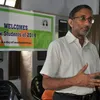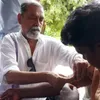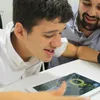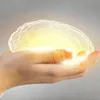Meet the Class 12 students who are developing an app to make mental healthcare accessible and affordable
Aditya Uchil and Ankur Samanta, 17-year-old students of Class 12, have designed the VeraMeet app for mental health patients. Powered by VR and AI, the app gives individuals the option to interact with either a virtual therapist or a live one.
An astounding 970 million people across the globe suffer from one form of mental disorder or the other, according to a report published by the Institute for Health Metrics and Evaluation (IHME) in 2017. And, India accounts for nearly 15 percent of the number, which translates to 145 million people.
A major issue despite the high incidence of depression, autism, schizophrenia, bipolarism, and anxiety, among other disorders, is the lack of accessibility to mental healthcare caused by a shortage of qualified therapists, the high costs associated with treatments, and the social stigma surrounding mental health. These were highlighted as part of the World Mental Health (WMH) survey conducted by the World Health Organisation (WHO).

Ankur Samanta and Aditya Uchil.
Two 17-year-old Class 12 students, Aditya Uchil and Ankur Samanta, are attempting to eliminate some of these barriers with the help of Virtual Reality (VR) and Artificial Intelligence (AI). The duo are in the process of establishing their startup, VerapAI, which will offer a platform that will integrate a virtual therapist, apart from live therapists, for the treatment of mental health problems.
Speaking to YourStory, Ankur says,
“The platform that we are building is a mobile application that can provide people suffering from mental disorders an avenue for social engagement, treatment and rehabilitation. We are designing it so that anybody who needs therapy can get it without hesitation about costs, availability or social stigma All they would need is a VR headset, a smartphone, and the VeraMeet app.”
As per the Substance Abuse and Mental Health Services Administration (SAMHSA), a US-based government agency, around 40 to 70 percent of mental health patients in developed countries either do not have easy access to therapy or choose not to opt for it. The percentage is as high as 90 percent in developing countries.
Aditya and Ankur are on a mission to reduce this percentage by delivering therapy worldwide in an affordable and convenient manner through their app.
Taking to technology
While Aditya is a VR developer and robotics enthusiast pursuing an IB diploma programme at The International School Bangalore (TISB), Ankur is an AI/NLP (natural language processing) and robotics enthusiast completing his final year at Irvington High School in California, USA.
The turning point in their lives came in 2018, when they were reading about the significant inadequacy of present mental health care options, specifically regarding the lack of accessibility due to the high-associated cost.
The duo kickstarted their endeavour by reading about and researching ways to eliminate the lacunae in treating mental health disorders. Being technophiles, they decided to power their initiative with technology. They began working on a model involving the application of multiple AI and VR-driven concepts with the goal of enabling treatment from a virtual therapist as well as a live one on the app.

A visual representing the eye tracking model used in the beta test.
After developing the therapeutic model, they decided to design a pilot test to examine the viability of AI-based therapy. They chose to target skills development in autistic children, specifically their ability to maintain eye contact, a key social skill.
“Ankur and I built a model to deploy an AI-driven virtual therapist called MARY to constantly have conversations with 25 autistic individuals and, at the same time, encourage them to make eye contact. We tracked the patients’ eye movements and the number of times they looked away from MARY, over a period of six weeks. A score was calculated, based on this data, in order to effectively present the level of eye-contact of the users. At the end, through an auto-generated report, we observed that they were making more eye contact than at the beginning of the study,” Aditya explains.
After the success of the beta test, the 17-year-olds wrote a research paper on their findings, and plunged into the creation of a digital server using various algorithms, through which patients can log on to the app at any time, interact with a virtual therapist, obtain rehabilitative therapy, and get themselves familiarised with different social situations, such as public speaking or communication, in a simulated and immersive environment.
An app that enables virtual therapy
The duo’s VeraMeet app gives patients, on registration, the option to interact with either the virtual therapist, MARY, or with live therapists available on its database. Both the categories of therapists can steer social engagement according to the patient’s needs and symptoms by engaging in conversations.
While the virtual therapy is driven by AI, Aditya and Ankur are planning to on-board live therapists by leveraging their network of contacts. In order to validate the therapeutic process on the app and steer the startup in the right direction, the boys are obtaining mentorship and advice from professional psychologists and pathologists.

An immersive environment created by the app as part of therapy.
“The app can be accessed by patients themselves, and is designed to simulate a therapy session. While we have integrated a virtual therapist along with live ones on the platform, it is important to understand that MARY is meant to augment the therapy process and not simply replace real-life therapists. The experience is personalised and immersive due to implementation of the AI model within Unity VR. With this engine, we are able to create a virtual simulated experience for the user which emulates that of a physical one. Also, all the participants in VeraMeet, both therapists and patients, will be represented by avatars to ensure that their identities are not disclosed,” Aditya says.
Aditya and Ankur have filed and registered their startup in the United States, and will be doing so in India soon - they aim to start operations working with organizations in both countries, eventually spreading to other countries from there. The duo managed to privately fund all their research and development efforts thus far, but, they are planning to obtain seed funding in the near future.
The VeraMeet app is expected to be launched in summer 2020 and will be available for download on both Android and iOS free of cost. To avail the therapy, the patient or their caregiver needs to invest in the purchase of a Cardboard VR headset, the price of which may range from Rs 800 to 1,200 ($15), say the entrepreneurs. However, the choice of headset does not impact the quality of the treatment or experience greatly.
Affordable and accessible mental healthcare
Aditya and Ankur’s VerapAI is dedicated to bring about a change in the mental health space by incorporating technology in the treatment process. At the tender age of 17, they seem set to do their bit to rehabilitate people suffering from mental health problems.
“Our vision is to help people from each and every corner of the world access therapeutic solutions for mental health without the pressure to pay expensive bills or worry about societal reactions and stigma. Since we have a chance to really make a difference in people’s lives with this, we want to do it the right way. All conversations and interactions on the VeraMeet app are encrypted and isolated, and the data used to train the models is sanitized of any trace to the individuals, so patients can rest assured that their safety and privacy will not be infringed upon or commercialised under any circumstance,” Ankur says.
The founders are presently in talks with NIMHANS to further test their product before launch.
(Edited by Athirupa Geetha Manichandar)










